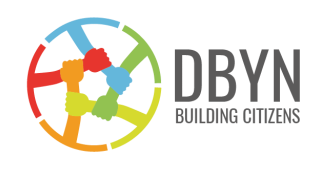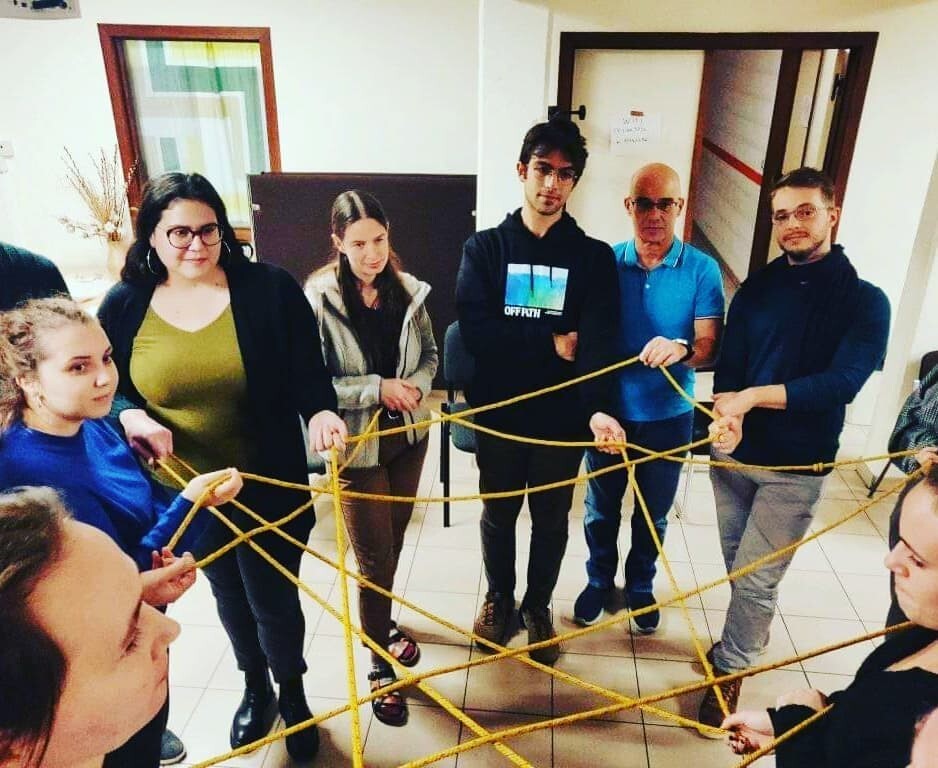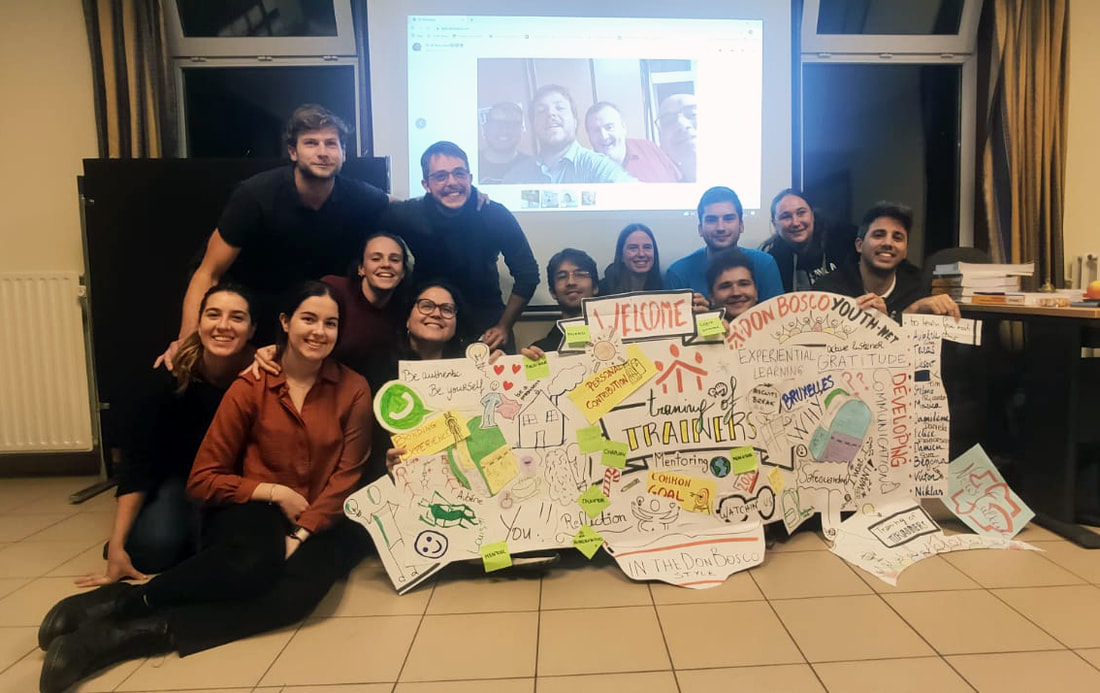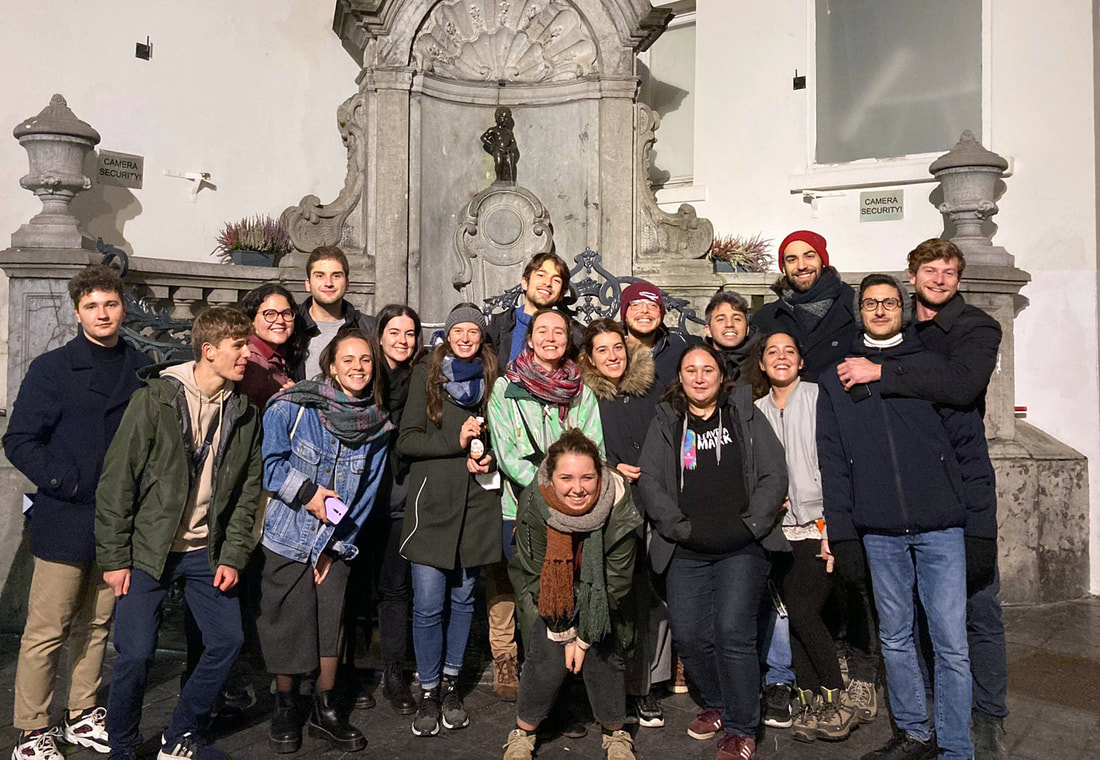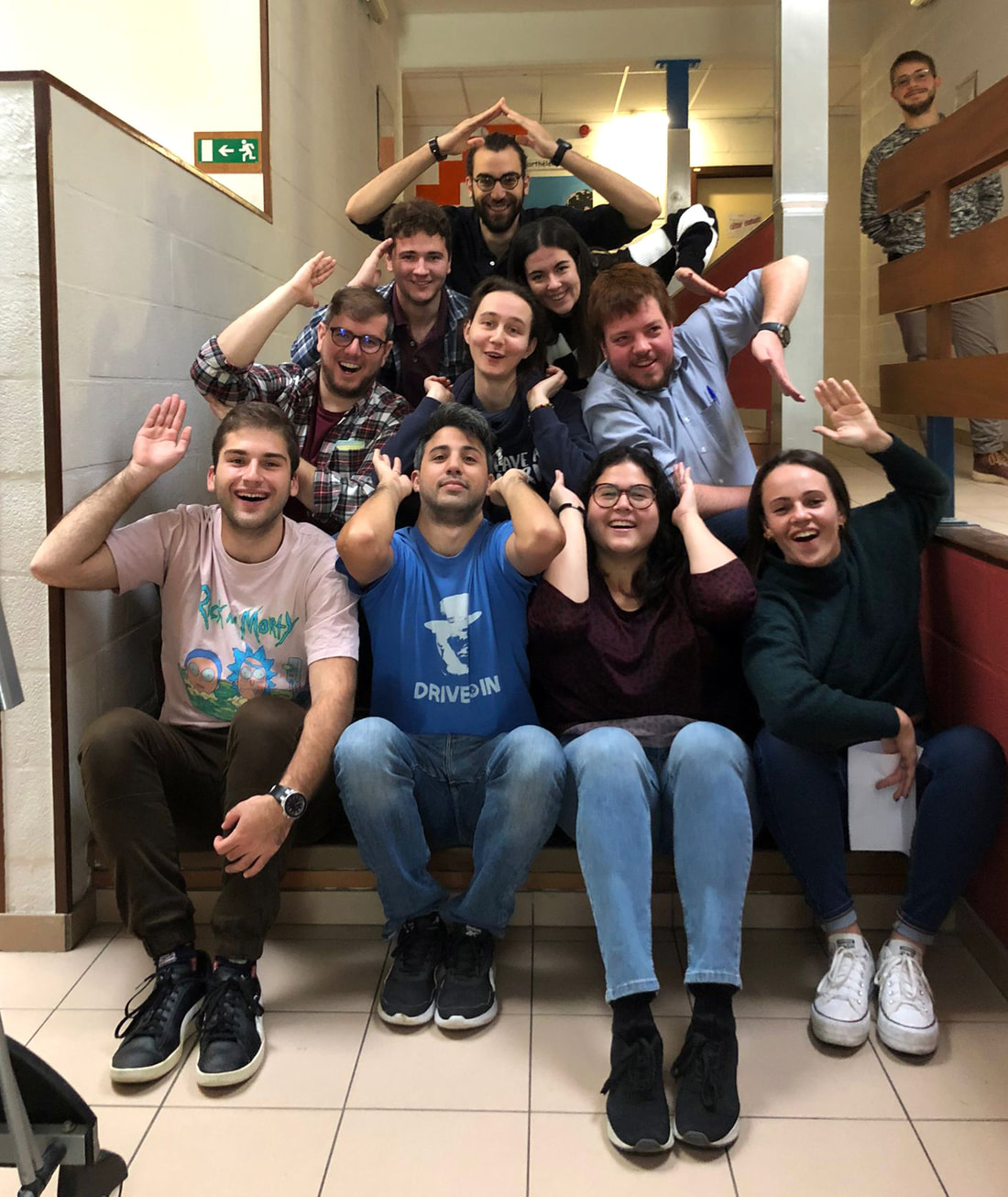Educate to Elevate Youth - Jamilène's testimonyThis article can also be found in Dutch on Jeugddienst Don Bosco's website here.
1 to 7 November 2021, Jeugddienst Don Bosco organised "Educate to Elevate", Training of Trainers, in cooperation with Don Bosco Youth-Net. An intense week full of cultural exchange and tools to start working as a trainer of European courses and activities yourself. We were with 13 participants from 9 different European Don Bosco partners from 7 different countries.
Jamilène from Youth to Connect in the Netherlands talks about her experience during Training of Trainers in Brussels. |
Project partnersFunders |
I am sitting at the stop in Eindhoven waiting for the Flixbus. "Just 5 more minutes and then the adventure can really begin" I think. Full of enthusiasm, I start visualising my week cultural exchanges, interesting conversations, educational training, lots of self-reflection and, of course, conviviality. Suddenly, I see the bus arriving. I put my suitcase in the bus and walk towards the driver to check in. With a big smile, I enter the bus and take a seat next to the window. Outside, I see all the beautiful trees covered with orange and yellow autumn leaves. I get a warm and happy feeling from this. Suddenly, the driver starts giving instructions. Everyone is on board and we can drive. "What a cool week this is going to be" I say to myself.
This training is designed to teach participants skills with the aim of eventually working actively themselves as trainers in European youth and young people's projects under Don Bosco Youth Net. The training was facilitated by Louis Debono of Malta, Stefano Di Maria of Italy and Bob Gardner of England. A total of 13 people from various Don Bosco projects in Europe participated, including Belgium, Germany, the Netherlands, Spain, Italy, Ukraine and Malta.
This training is designed to teach participants skills with the aim of eventually working actively themselves as trainers in European youth and young people's projects under Don Bosco Youth Net. The training was facilitated by Louis Debono of Malta, Stefano Di Maria of Italy and Bob Gardner of England. A total of 13 people from various Don Bosco projects in Europe participated, including Belgium, Germany, the Netherlands, Spain, Italy, Ukraine and Malta.
|
Day 1 - Introduction
The first day focused on getting to know the participants and trainers. We did various energisers to get to know each other's names and countries. It was funny to see how people made up other names for me because they had difficulty pronouncing my name. Fortunately, they could by the end of the evening. Besides the energisers, we went through the programme and set up a team contract. Respect, communication, listening well and learning from each other were some of the agreements we made with each other. It was nice to listen to the needs of others and what they find important in the training. In my opinion, this provided a safe foundation for the whole week. After introductions, there was room for socialising. In the evening, there was room to chill in a youth room. Here we played table football, socialised and sang various songs. On the first day, I already felt part of the group. |
Day 2 - Non-formal learning, Experiential learning cycle & Intercultural evening
The second day focused on our qualities, our vision of an ideal trainer and non-formal learning. We made a backpack on which we wrote all our qualities. We also wrote down our goals and expectations from the training. I wanted to learn new skills in trainership and learn from the other participants. Lastly, I also wanted to be open to making mistakes and leave my perfectionist attitude behind. After the discussion, we went to clay in small groups. In a creative way, we had to create the ideal trainer in combination with Don Bosco's preventive system. This is a pedagogical system that all Don Bosco organisations work with.
In the afternoon, a female trainer Ela Jakubek-Grootjans from Belgium came to tell us more about non-formal learning. For this, we had to learn the cup song in our group and eventually present it. Here the link was made to Kolb's experiential learning cycle. David Kolb is a learning psychologist and pedagogue who particularly focused on experiential learning. He developed the experiential learning cycle to give a picture about the various learning styles and associated behaviours. "There are various learning styles and it is important as a trainer to be aware of this when working with children and young people," he says.
We ended the evening with a cross-cultural evening where everyone brought food from their own country. It was nice to see how food can connect people even if they know each other very briefly.
The second day focused on our qualities, our vision of an ideal trainer and non-formal learning. We made a backpack on which we wrote all our qualities. We also wrote down our goals and expectations from the training. I wanted to learn new skills in trainership and learn from the other participants. Lastly, I also wanted to be open to making mistakes and leave my perfectionist attitude behind. After the discussion, we went to clay in small groups. In a creative way, we had to create the ideal trainer in combination with Don Bosco's preventive system. This is a pedagogical system that all Don Bosco organisations work with.
In the afternoon, a female trainer Ela Jakubek-Grootjans from Belgium came to tell us more about non-formal learning. For this, we had to learn the cup song in our group and eventually present it. Here the link was made to Kolb's experiential learning cycle. David Kolb is a learning psychologist and pedagogue who particularly focused on experiential learning. He developed the experiential learning cycle to give a picture about the various learning styles and associated behaviours. "There are various learning styles and it is important as a trainer to be aware of this when working with children and young people," he says.
We ended the evening with a cross-cultural evening where everyone brought food from their own country. It was nice to see how food can connect people even if they know each other very briefly.
Day 3 - Feedback & Preparing training sessions
The third day we had started with a feedback round for the trainers. Here, we as participants were allowed to give feedback on how we had experienced the training so far and what we could do to improve our experience. The trainers were open to our feedback and were happy with how open and honest we were. After the feedback came the big surprise. We are officially trainers ourselves and had to design and deliver trainings to each other from now on. I found this difficult to hear and felt tension in my body. Fortunately, as a group we started brainstorming and writing down what kind of workshops we wanted to set up over the next few days. We had the whole afternoon to discuss and set up our training sessions. The third day was very tough for me, so I went to bed earlier. I needed to conserve energy to sustain the rest of the week.
The third day we had started with a feedback round for the trainers. Here, we as participants were allowed to give feedback on how we had experienced the training so far and what we could do to improve our experience. The trainers were open to our feedback and were happy with how open and honest we were. After the feedback came the big surprise. We are officially trainers ourselves and had to design and deliver trainings to each other from now on. I found this difficult to hear and felt tension in my body. Fortunately, as a group we started brainstorming and writing down what kind of workshops we wanted to set up over the next few days. We had the whole afternoon to discuss and set up our training sessions. The third day was very tough for me, so I went to bed earlier. I needed to conserve energy to sustain the rest of the week.
Day 4 & 5 - Presenting trainings & going out in Brussels
On the fourth day, I had a lot of energy and was able to continue with the training. In total, as participants, we jointly set up 7 trainings on communication skills, intercultural learning, visual support, role of the trainer, human rights, group management and evaluation. I delivered the communication skills and intercultural learning trainings myself, together with two other participants. It was nice to see how eager the participants were to learn from each other. There was really a lot of knowledge and creativity in the house and this really inspired me. In the evening, we scheduled personal talks with a trainer, which was also called mentoring. My mentor was Louis and he complimented me on my skills and tipped me to develop this further. I felt really empowered and was also able to finish the evening well because of this. Every day we have a good night or good morning where someone reads a poem, song or prayer. I did a good night on gratitude. Here participants could pick a postcard and write down what they were grateful for. It was a lovely evening and I went to bed feeling happy.
On the fifth day, we had the rest of the trainings. Especially in the group management training, it was interesting to see what roles are common in a group. We had to perform "The Mission Impossible" with 10 different tasks within 40 minutes. In the end, we had completed all the tasks within the time. Afterwards, we were going to evaluate the group process. It turns out that some people are task-oriented and others are process-oriented. As a group, we reflected on this and looked at the impact this has on training. Another important training we had was about safeguarding by priest Bob Gardner. Here we briefly looked together at the elements of safeguarding and how we can implement it within our organisation. An interesting session that really got me thinking and something I will definitely take with me to Youth to Connect.
After the various training sessions, we all went to the centre of Brussels to have dinner together and explore the city. It was a fun evening where we took lots of pictures, ate waffles and tasted special beer. On our return, we sang karaoke in the trainers' room. It was fun, funny and I went back to my room with a smile.
On the fourth day, I had a lot of energy and was able to continue with the training. In total, as participants, we jointly set up 7 trainings on communication skills, intercultural learning, visual support, role of the trainer, human rights, group management and evaluation. I delivered the communication skills and intercultural learning trainings myself, together with two other participants. It was nice to see how eager the participants were to learn from each other. There was really a lot of knowledge and creativity in the house and this really inspired me. In the evening, we scheduled personal talks with a trainer, which was also called mentoring. My mentor was Louis and he complimented me on my skills and tipped me to develop this further. I felt really empowered and was also able to finish the evening well because of this. Every day we have a good night or good morning where someone reads a poem, song or prayer. I did a good night on gratitude. Here participants could pick a postcard and write down what they were grateful for. It was a lovely evening and I went to bed feeling happy.
On the fifth day, we had the rest of the trainings. Especially in the group management training, it was interesting to see what roles are common in a group. We had to perform "The Mission Impossible" with 10 different tasks within 40 minutes. In the end, we had completed all the tasks within the time. Afterwards, we were going to evaluate the group process. It turns out that some people are task-oriented and others are process-oriented. As a group, we reflected on this and looked at the impact this has on training. Another important training we had was about safeguarding by priest Bob Gardner. Here we briefly looked together at the elements of safeguarding and how we can implement it within our organisation. An interesting session that really got me thinking and something I will definitely take with me to Youth to Connect.
After the various training sessions, we all went to the centre of Brussels to have dinner together and explore the city. It was a fun evening where we took lots of pictures, ate waffles and tasted special beer. On our return, we sang karaoke in the trainers' room. It was fun, funny and I went back to my room with a smile.
Day 6 - Evaluation & Farewell party
The last day of this beautiful training broke. We started the morning with a training by Don Bosco Youth-Net's president Niklas. He gave us a training on conflict management with the aim of making us aware of the different phases of conflict and what skills we can use to prevent and resolve conflicts. Conflict management is an exciting topic for me, but after this training I gained more insight on how to deal with it.
Now it was time for evaluation. Together we evaluated and discussed our goals. The participants' reactions were mostly positive and enthusiastic. We got the chance to facilitate a training course, learned about our qualities and pitfalls as trainers, and also learned new skills and methods we can use during training. It was a successful training and I am very grateful to have had the opportunity to participate in it. To conclude our experience, we also organised a church service. We prayed together, sang and thanked God for this beautiful week together.
And now it's time for a FIESTA! Together with Taras from Ukraine, I transformed the trainers' room into a pub. We decorated the room with balloons, made a dance floor and set up a table with all the food and drinks. Together, we all started dancing to music from different countries. It was fun and we ended up really sweating. The best part of this evening was that we also celebrated a birthday of participant Francesco from Italy. It was a surprise for him when we started singing and handing out cake at noon. A farewell party and birthday in one does not happen easily!
The last day of this beautiful training broke. We started the morning with a training by Don Bosco Youth-Net's president Niklas. He gave us a training on conflict management with the aim of making us aware of the different phases of conflict and what skills we can use to prevent and resolve conflicts. Conflict management is an exciting topic for me, but after this training I gained more insight on how to deal with it.
Now it was time for evaluation. Together we evaluated and discussed our goals. The participants' reactions were mostly positive and enthusiastic. We got the chance to facilitate a training course, learned about our qualities and pitfalls as trainers, and also learned new skills and methods we can use during training. It was a successful training and I am very grateful to have had the opportunity to participate in it. To conclude our experience, we also organised a church service. We prayed together, sang and thanked God for this beautiful week together.
And now it's time for a FIESTA! Together with Taras from Ukraine, I transformed the trainers' room into a pub. We decorated the room with balloons, made a dance floor and set up a table with all the food and drinks. Together, we all started dancing to music from different countries. It was fun and we ended up really sweating. The best part of this evening was that we also celebrated a birthday of participant Francesco from Italy. It was a surprise for him when we started singing and handing out cake at noon. A farewell party and birthday in one does not happen easily!
|
Day 7 - Back home
With sadness, I packed my bags and said goodbye to the participants and trainers. For me, it was a special and 'once in a lifetime experience' to meet such beautiful people. I go home with much more knowledge and confidence to offer to my organisation Youth to Connect. I have developed further as a trainer and as a person. Can't wait for my next adventure! |
VenueThe training course took place in Don Bosco Ganshoren (Brussels), Belgium. Don Bosco Ganshoren is a facility from the Salesian Sisters (FMA) and is boarding pupils and students and hosting Salesian activities.
You can find more info here: www.donboscoganshoren.be |
